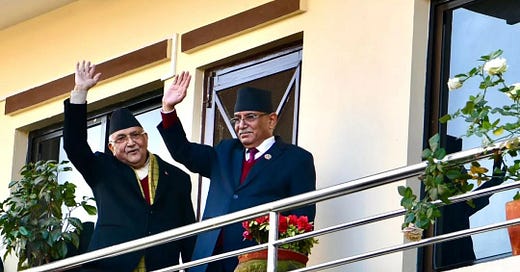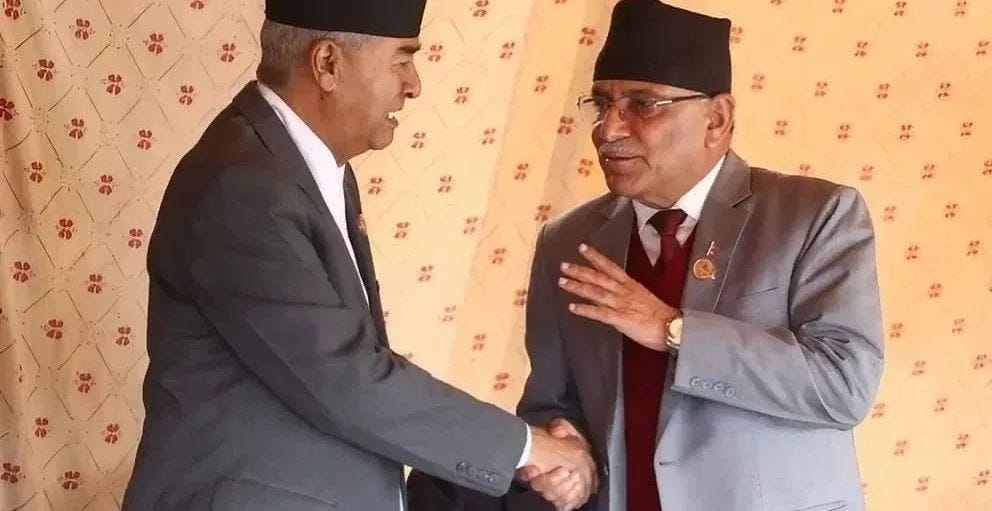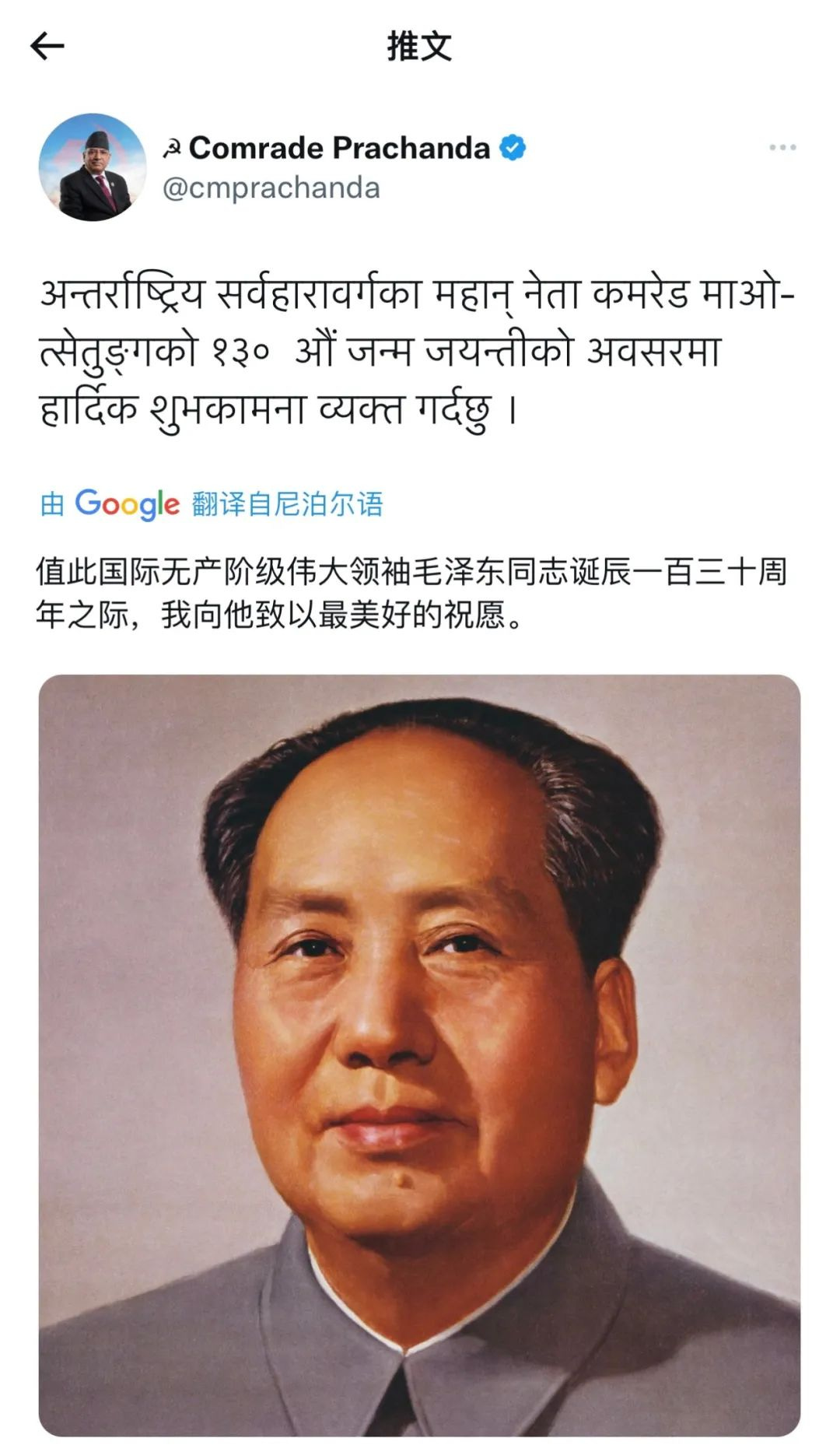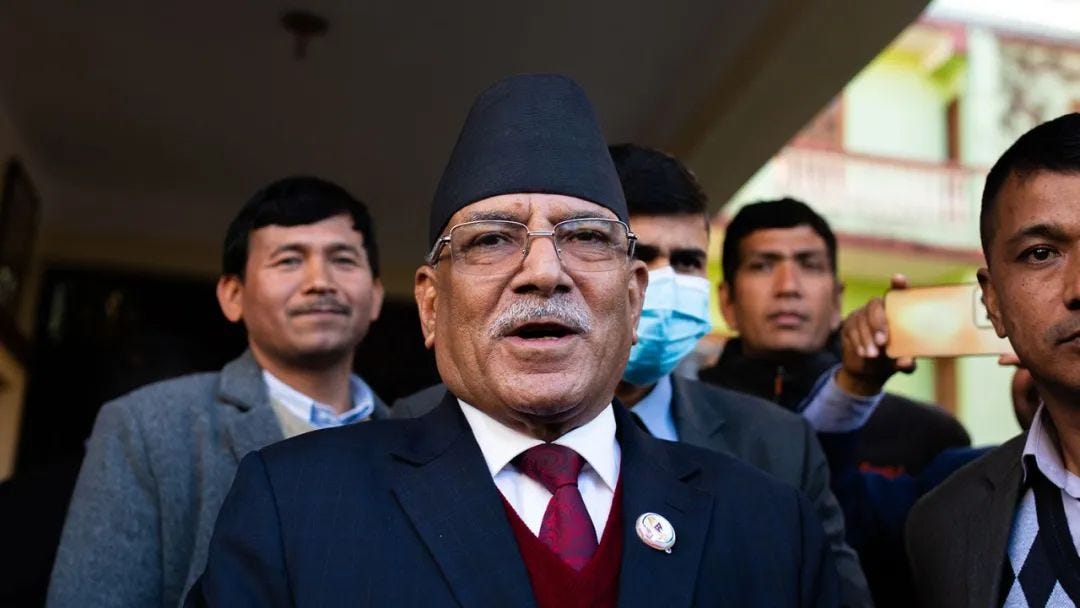Prachanda sworn in as Prime Minister of Nepal, not forgetting to commemorate Mao Zedong's birthday
Prachanda, chairman of the Communist Party of Nepal (Maoist Center), was sworn in as Prime Minister of Nepal on the 26th. The Communist Party of Nepal (Maoist Center), the Communist Party of Nepal (United Marxist-Leninist), and the National Independent Party1 decided on the 25th to form a majority party alliance in the House of Representatives and recommended Prachanda to be the prime minister. Prachanda won the support of 169 lawmakers in the 275-seat House of Representatives, far exceeding the 138 needed. Therefore, according to the constitution, Nepalese President Bhandari officially appointed Prachanda as the prime minister on the 25th.
Meanwhile, Bishnu Poudel, senior leader of the Communist Party of Nepal (Unified Marxist-Leninist), Narayan Kaji Shrestha, senior leader of the Communist Party of Nepal (Maoist Center), and Rabi Lamichhane, chairman of the National Independence Party, were sworn in as Deputy Prime Minister.
Bishnu Poudel will also be in charge of the Ministry of Finance, Narayan Kaji Shrestha will be in charge of the Ministry of Infrastructure and Transport, and Rabi Lamichhane will lead the Home Ministry.
In addition, 4 other people have been sworn in as government ministers, but details are yet to be clear. As a result, there are currently 8 people in the cabinet of the Nepalese government, 4 of whom are from the Communist Party of Nepal (United Marxist-Leninist), and 2 are from the Communist Party of Nepal (Maoist Center). Such a distribution model is basically in line with the power comparison of the parties.
Rabi Lamichhane acquisition of the Home Ministry is also of great significance.
December 25 is also known as a dramatic turning point in Nepali politics. The Nepal Congress Party, the largest party in the House of Representatives of Nepal, was abandoned by Prachanda in an instant and became the opposition party. As a result, the Nepal Congress Party not only lost the right to form a cabinet at the federal government level, but it is even very likely to lose the leadership of the seven provincial governments in Nepal.
Then, within the Nepal Congress Party, Deuba, the chairman of the Nepal Congress Party, may issue a "Guilty Edict"2, which will be a major blow to his future political career.
Prachanda commemorates Mao Zedong's birthday
As the name suggests, the Communist Party of Nepal (Maoist Center) itself uses Mao Zedong Thought as its ideological guide. December 26 is Mao Zedong's birthday. And on December 26 this year, it was the third time that Prachanda took the oath as Prime Minister of Nepal. On this day, he posted on his Twitter account to commemorate Mao Zedong.
Congratulations from china
Chinese Foreign Ministry Spokesperson Mao Ning hosted a regular press conference on December 26.
Mao Ning said that the Chinese side noticed that the general election in Nepal was completed smoothly and smoothly, and congratulated Mr. Prachanda on his appointment as the new Prime Minister of Nepal. It is believed that with the joint efforts of the Nepalese government and people, and with the consultation and coordination of various parties and political forces, Nepal will maintain national stability and economic and social development.
As a traditional friendly neighbor, China attaches great importance to China-Nepal relations, and is willing to work with the new government of Nepal to expand and deepen friendly exchanges and cooperation between the two countries in various fields, and jointly build the "Belt and Road" with high quality. The cooperative partnership has injected new impetus and created more benefits for the two peoples.
Prachanda's conundrum
It is undeniable that Prachanda's victory this time is due to his well-used strategy.
However, the so-called good use of strategies is just a way to have to do when one's own strength is not strong enough.
In this year's general election for the Nepalese House of Representatives, the CPN (Maoist Center) was not satisfied with the number of votes they got.
Therefore, what the Communist Party of Nepal (Maoist Center) needs to do in the future is to strengthen the cohesion within the party through practical measures, and enhance its influence and favorability in the country. Otherwise, after a few years, they will have to engage in this frightening strategy again.
People are prone to heart disease.
From the perspective of governance, Prachanda needs to bridge the differences that may exist within the seven parties, and this challenge is also great. If it is not done well, it is easy to fall apart again.
CNN pointed out that Prachanda faced relatively large challenges in economic governance. But I don't think there's much to worry about. There is a high probability that problems such as COVID and the Ukraine crisis will not last long, and Nepal's economy will easily bottom out and rebound. This bottoming out will also be credited with effective governance.
This news article appeared in Nepal Express and can be accessed in Chinese language here.
[Please note: If you are interested to reproduce our translation works, please contact us in advance. Contact us: thearanikoproject@gmail.com]
Its Rastriya Swatantra Party (RSP) but because of direct translaiton, we decided to keep it as the translated name.
In Chinese: 罪己诏 (Zuì jǐ zhào). This word was used in the past for emperors to introspect or review their own faults when problems occurred in the court. It usually appears in three situations: One is the misplacement of the monarch and his ministers, the second is during major natural disaster, and third is when political power is in crisis.









If a modern, distant country like Switzerland can be abused by China, can people not see how China is progressively applying its own hegemonic exigencies on its immediate neighbour, Nepal? Of course for China such efforts are necessary so as to be on India's doorstep as well as to entice certain politicians to accept whatever 'aid' be offered by China. But I do not think the majority of Nepalis would like their country to become a vassal state of China.
https://www.swissinfo.ch/eng/how-china-infiltrates-switzerland/47301260